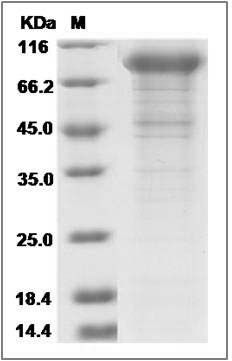-
Product Name
Rat Cadherin-6/CDH6 (His Tag) recombinant protein
- Documents
-
Description
Cadherins are a family of calcium-dependent, cell-cell adhesion molecules that play an important morphoregulatory role in a wide variety of tissues. Alterations in cadherin function have been implicated in tumor progression in a number of adenocarcinomas. Cadherin-6 (CDH6), also known as K-cadherin (KCAD), is a type-II classic cadherin cell-cell adhesion molecules, which are expressed in graded or areal patterns, as well as layer-specific patterns, in the cortical plate. Human Cadherin-6 is synthesized as a 790 aa type I transmembrane glycoprotein that contains a 18 aa signal peptide, a 35 aa propeptide, a 562 aa extracellular region, a 21 aa transmembrane segment, and a 154 aa cytoplasmic domain. There are five cadherin domains of approximately 110 aa each in the extracellular region. Cadherin-6 is highly expressed in brain, cerebellum, and kidney, and may contribute to the formation of the segmental structure of the early brain, as well as the development of renal proximal tubules. Weak expression is also detected lung, pancreas, and gastric mucosa. Additionally, it is specifically expressed in the proximal tubule of normal kidneys and in renal cell cancer. Thus , Cadherin-6 is a new prognostic factor for renal cancer.
-
Protein short names
CADHERIN-6; K-CADHERIN; MGC129338; CDH6; CAD6; MGC129360; KCAD
-
Source/Expression Host
Human Cells
-
Expression Plasmid/cDNA
A DNA sequence encoding the rat CDH6 (EDL82944.1) (Met1-Ala615) was expressed with a polyhistidine tag at the C-terminus.
-
Protein Species
Rat
-
Molecular weight
The recombinant rat CDH6 comprises 608 amino acids and predicts a molecular mass of 67.9 kDa.
-
Purity
> 80 % as determined by SDS-PAGE
-
Validations

Rat Cadherin-6 / CDH6 Protein (His Tag)
Related Products / Services
Please note: All products are "FOR RESEARCH USE ONLY AND ARE NOT INTENDED FOR DIAGNOSTIC OR THERAPEUTIC USE"
